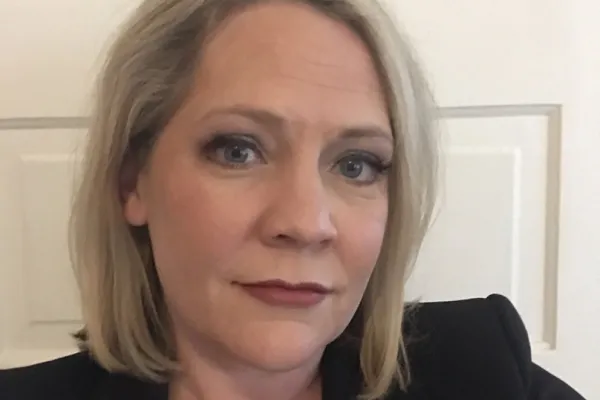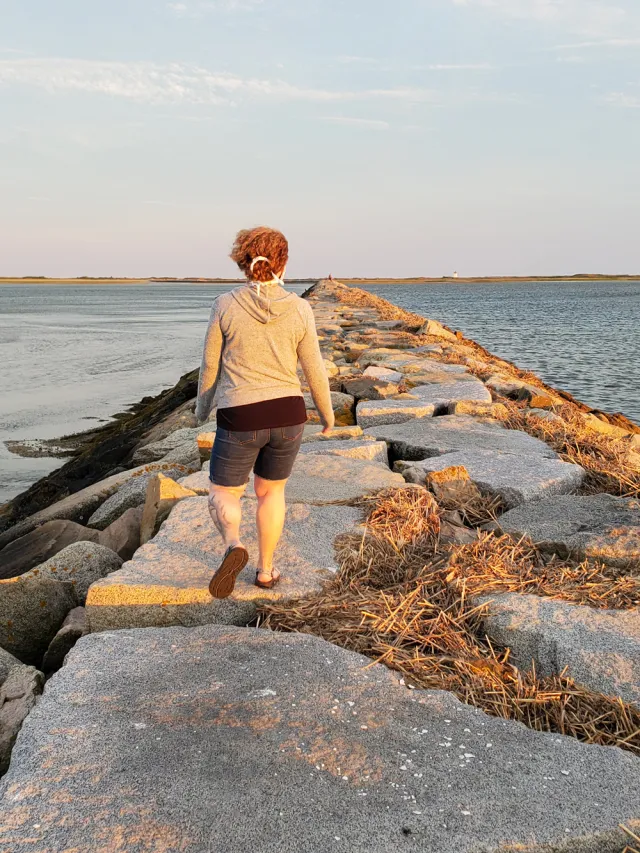Getting to the Heart of COVID-19
Alum News

Published July 24, 2020
Since the beginning of the pandemic virologist Angela Rasmussen ’00 has been one of the media’s go-to experts on the subject of SARS-CoV-2 and COVID-19 and New York Times columnist Carl Zimmer even named Rasmussen one of the scientists to follow on Twitter. Find out why she is so intrigued with viruses in general and what makes this one particularly unique, including the social-cultural ramifications.
Rasmussen’s fascination with viruses began in the fifth grade, when she contracted pneumonia and was left with chronic asthma. “I was very interested in how these tiny things that you can’t even see cause such severe disease,” she says. “How can something invisible make you so sick and cause you long-lasting problems?”
Rasmussen’s research explores how a host responds to a virus. “Given that all viruses have to infect a host, viruses are obligate parasites,” she says. “It’s always relevant to know how the host is responding as well as how the virus itself works—what kinds of host responses and what kind of genes are expressed in response to infection over time.”
As an expert, Rasmussen, who is currently an associate research scientist at Columbia University’s Mailman School of Public Health, advocates for all the common sense and scientifically based practices for combating a pandemic, including social distancing and wearing masks. Here she talks about some of the things we’ve learned about COVID-19 since it emerged, her concerns about rushing a vaccine and how the pandemic has brought to light issues of equity.
Virology 101
Viruses can’t exist on their own; they have to have a host. That’s why there’s a big philosophical debate about whether viruses are alive or not. They can’t replicate independently. They can’t reproduce themselves without infecting a host cell. I think of viruses more as machines. People have a real tendency to anthropomorphize them, talk about what a virus wants to do or what a virus thinks. Viruses are really just a set of instructions to make more viruses. It’s sort of incidental whether or not they actually cause disease. Since a virus is under evolutionary pressure to reproduce itself, a really effective virus would be one that doesn’t affect its host at all, so it can fly under the radar and just replicate efficiently.
Viruses Are Here to Stay
I don’t think viruses are going anywhere. And they are an important part of the ecosystem, too. Viruses drive evolution of their host. They may not even be infectious anymore, capable of producing viruses or causing disease, but they can drive the way that we evolve, and they have driven evolution across millennia.
Unexpected Effects of SARS-CoV-2 and COVID-19
One of the things that I think is surprising to a lot of people is this virus doesn’t just cause pneumonia; it doesn’t just cause respiratory disease. There are indications that it affects other parts of the body. There have been reports of kidney and liver disease. It may damage the beta islet cells of the pancreas that produce insulin and may predispose people to diabetes, which may explain why people with diabetes have a different risk factor for severe COVID-19. There are reports of weird clotting abnormalities and cardiac effects and neurological things like the loss of sense of smell or taste.
Current Treatment Protocol: Everything and the Kitchen Sink
People are screening compounds that are not approved drugs, or haven’t been used for anything, to see if we can find new compounds that might be effective, mostly as antivirals. There are other drugs being studied that treat the patient’s immune and inflammatory responses that are out of control, which is associated with the most severe cases. Some of those are also in trials right now to see if they can help patients with the most severe disease. In many cases, if doctors have a patient who’s on a vent, they throw the kitchen sink at them. They treat them with everything they can think of that might be safe. So, I think we’re going to see a lot of observational data like that: “We used this to treat X number of patients, and they got better.” From there, people will start doing randomized, controlled clinical trials.
The Potential Consequences of Rushing a Vaccine
My biggest concerns are that we might approve a vaccine that’s not effective. There’s only so much you can do to hurry the process along. People have talked about ways to speed this up, like doing human challenge trials, which I don’t think is a very good idea because this is a deadly virus and we don’t know what the long-term sequelae of being infected are. So, I think it would be almost impossible for people to actually give informed consent to participate in a human challenge trial like that. The other thing is that you wouldn’t be getting data about how the vaccine works in the most vulnerable people. Older people or people with preexisting conditions that we know are risk factors would be excluded from a human challenge trial like that, so we wouldn’t know if, say, the vaccine is less effective in those people.
The Socio-Political Fallout of COVID-19
What I hope comes out of all of this is increased equity—gender equity, equity for LGBTQ+ people, racial equity and religious equity. That’s easier said than done. This pandemic has made clear, at least as far as gender is concerned, that there are still very gendered responsibilities in our society. Many people are working from home, for example. Women tend to take on more of the housework and responsibilities for caring for others in their household. As a result, women have been disproportionately affected by that. In science, we’ve seen that women are submitting fewer papers. They’re submitting fewer grant applications. To my knowledge, there isn’t really a policy level plan to address this. One thing that I’ve experienced both in my work and on the National Institutes of Health advisory committee to the Working Group on Changing the Culture to End Sexual Harassment is that it’s a challenge to even convince people there’s a problem. Many men—and some women—will say, “I’m for equity. I’m not racist. I’m not sexist,” but that doesn’t change the fact that they aren’t actively doing anything against it. That’s what the Shut Down STEM movement and the Black Lives Matter protests have really drawn to people’s attention—that it’s not enough to just not be racist or not be sexist or not be homophobic or transphobic. You have to actively be against those things.
Vacationing in the Summer of COVID-19

According to virologist Angela Rasmussen ’00, you can vacation safely this summer. “Anything you do that’s outside of your house is probably going to be an increased risk,” she says. “But I think, in general, renting a cottage or an Airbnb is relatively safe. It looks like contaminated surfaces are less of a risk driver of transmission than droplets. It’s okay to go on vacation, but just avoid crowds. Avoid large numbers of people that are not in your household, or socialize outside. Go to restaurants if you can dine outdoors. Indoor environments are a higher risk for transmission. Even though masks have unfortunately been politicized, they can be very helpful in reducing transmission if they’re adopted by most of the people in a population. They don’t protect the wearers, but they protect everybody else around them.’